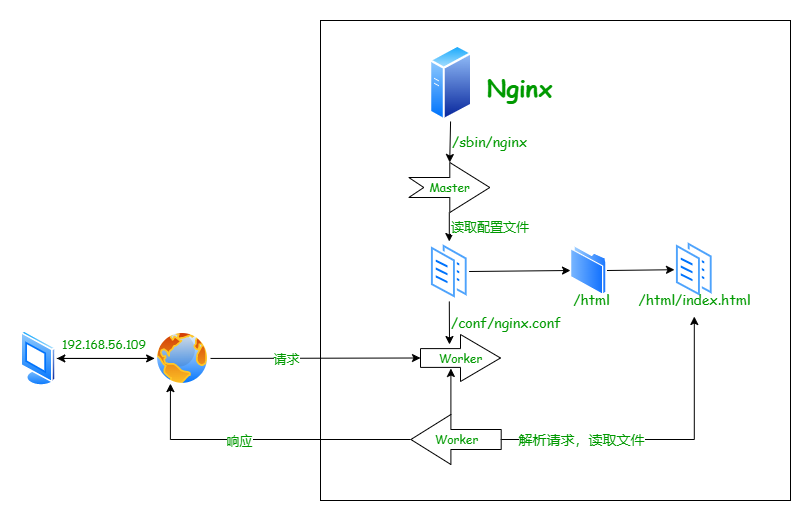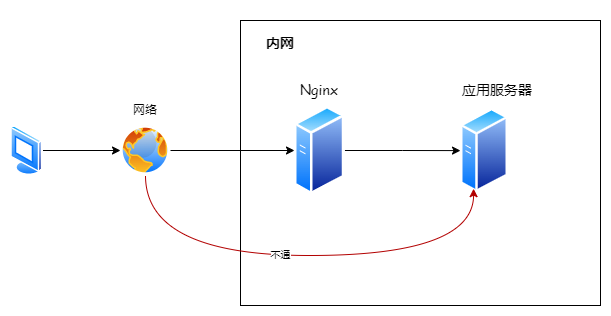Nginx学习
本次主要是基于LinuxMint操作系统进行操作。LinuxMint操作系统类似于Ubuntu系统。
Nginx下载安装
首先去官网下载nginx安装包,这里我选择的是nginx1.22.1版本。
然后安装好相关依赖:
# 安装pcre库
sudo apt-get install libpcre3 libpcre3-dev -y
# 安装zlib库
sudo apt-get install zlib1g-dev -y# 解压nginx压缩包
tar -zxvf nginx-1.22.1.tar.gz
# 对nginx压缩包重命名
mv nginx-1.22.1 nginx
cd nginx
# 安装nginx
./configure --prefix=/usr/local/nginx
make
make install
# 进入安装的目录
cd /usr/local/nginx
# 启动nginx
sudo ./nginx# 编写服务脚本
vim /usr/lib/systemd/system/nginx.service# 内容如下
[Unit]
Description=nginx - web server
After=betwork.target remote-fs.target nss-lookup.target
[Service]
Type=forking
PIDFile=/usr/local/nginx/logs/nginx.pid
ExecStartPre=/usr/local/nginx/sbin/nginx -t -c /usr/local/nginx/conf/nginx.conf
ExecStart=/usr/local/nginx/sbin/nginx -c /usr/local/nginx/conf/nginx.conf
ExecReload=/usr/local/nginx/sbin/nginx -s reload
ExecStop=/usr/local/nginx/sbin/nginx -s stop
ExecQuit=/usr/local/nginx/sbin/nginx -s quit
PrivateTmp=true
[Install]
WantedBy=multi-user.target# 重启服务
systemctl daemon-reload
# 查看以及启动的nginx进程
ps -ef |grep nginx
# 终止nginx进程
sudo kill -9 nginx的进程号
# 启动nginx进程
systemctl start nginx.service
# 设置开机自启动
systemctl enable nginx.service
# 查看nginx的状态
systemctl status nginx.serviceNginx响应流程

ServerName的匹配规则
- 完整匹配
- 通配符匹配
- 正则匹配
反向代理

可以通过proxy_pass反向代理到公网
负载均衡
使用upstream和proxy_pass实现负载均衡(默认情况是使用轮询,缺点是:无法保持会话),nginx的配置文件如下:
#user nobody;
# 工作的进程的个数
worker_processes 1;
#error_log logs/error.log;
#error_log logs/error.log notice;
#error_log logs/error.log info;
#pid logs/nginx.pid;
# 事件驱动模块
events {
# worker可以创建多少连接
worker_connections 1024;
}
# http模块
http {
# 引入请求头文件
include mime.types;
default_type application/octet-stream;
#log_format main '$remote_addr - $remote_user [$time_local] "$request" '
# '$status $body_bytes_sent "$http_referer" '
# '"$http_user_agent" "$http_x_forwarded_for"';
#access_log logs/access.log main;
sendfile on;
#tcp_nopush on;
#keepalive_timeout 0;
keepalive_timeout 65;
#gzip on;
#与server同级
upstream tomcat{
server 192.168.56.109:8080;
server 192.168.56.109:8081;
}
server {
listen 80;
server_name localhost;
#charset koi8-r;
#access_log logs/host.access.log main;
location / {
# 配置负载均衡
proxy_pass http://tomcat;
#root html;
#index index.html index.htm;
}
#error_page 404 /404.html;
# redirect server error pages to the static page /50x.html
#
error_page 500 502 503 504 /50x.html;
location = /50x.html {
root html;
}
# proxy the PHP scripts to Apache listening on 127.0.0.1:80
#
#location ~ \.php$ {
# proxy_pass http://127.0.0.1;
#}
# pass the PHP scripts to FastCGI server listening on 127.0.0.1:9000
#
#location ~ \.php$ {
# root html;
# fastcgi_pass 127.0.0.1:9000;
# fastcgi_index index.php;
# fastcgi_param SCRIPT_FILENAME /scripts$fastcgi_script_name;
# include fastcgi_params;
#}
# deny access to .htaccess files, if Apache's document root
# concurs with nginx's one
#
#location ~ /\.ht {
# deny all;
#}
}
# another virtual host using mix of IP-, name-, and port-based configuration
#
#server {
# listen 8000;
# listen somename:8080;
# server_name somename alias another.alias;
# location / {
# root html;
# index index.html index.htm;
# }
#}
# HTTPS server
#
#server {
# listen 443 ssl;
# server_name localhost;
# ssl_certificate cert.pem;
# ssl_certificate_key cert.key;
# ssl_session_cache shared:SSL:1m;
# ssl_session_timeout 5m;
# ssl_ciphers HIGH:!aNULL:!MD5;
# ssl_prefer_server_ciphers on;
# location / {
# root html;
# index index.html index.htm;
# }
#}
}可以通过在upstream模块中配置每台服务器的权重(值越大表示,权重越高):
也可以使用down进行停用,使用backup进行备用。
upstream tomcat{
server 192.168.56.109:8080 weight=8 down;
server 192.168.56.109:8081 weight=2;
server 192.168.56.109:8083 weight=1 backup;
}其他负载均衡方式:(url_hash和fair需要第三方插件)
- ip_hash:根据客户端的ip地址转发同一服务器,可以保持会话。
- least_conn:最少连接数访问。
- url_hash:根据url进行定向转发。
- fair:根据后端服务器的响应时间进行转发。
动静分离
直接使用location进行配置即可。
URLRewrite伪静态
可以隐藏url参数
- last:继续向下匹配
- break:不在继续匹配
- redirect:302临时重定向
- permanet:301永久重定向
在location中配置,如:rewrite ^/([0-9]+).html$ /index.jsp?pageNum=$1 break
防盗链
配置在location下面
- none:检测Referer头不存在的情况。
- blocked: 检测Referer头的值被防火墙或者代理服务器删除或伪装的情况。
- server_names:设置一个或多个URL,检测Referer头是否是URL中的一个。
location ~*/(js|img|css){
valid_refers 192.168.56.109;
if($valid_refers){
return 403;
}
root html;
index index.html index.htm;
}安装keepalived实现高可用
apt install keepalived -y



